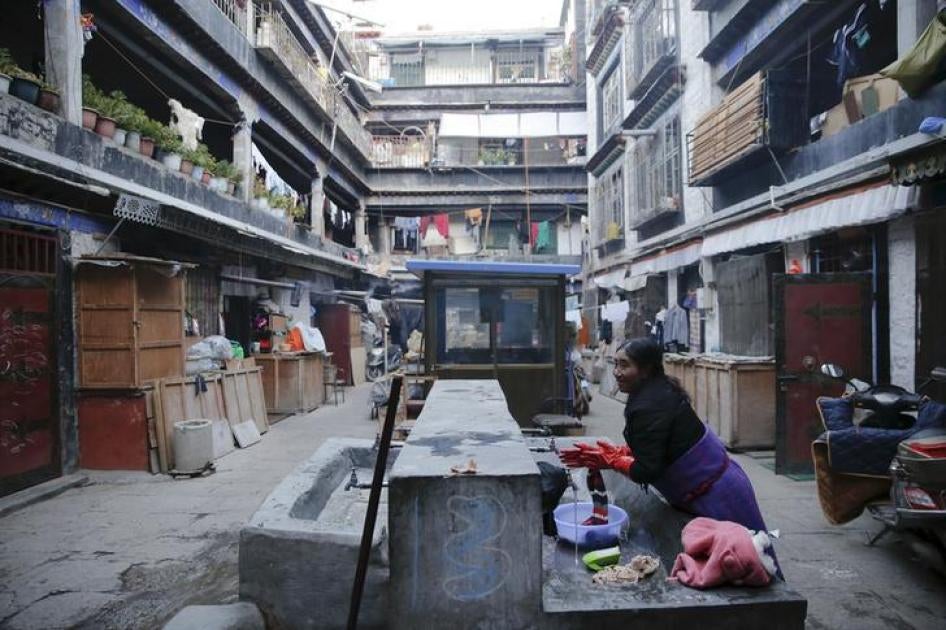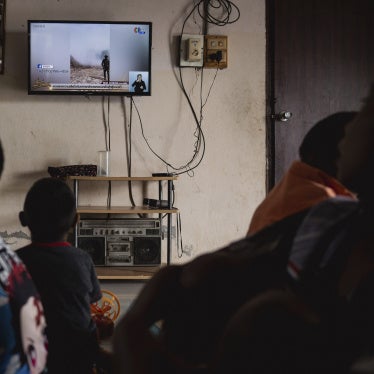(New York) – Chinese authorities have indefinitely extended an intensive surveillance program in villages across the Tibet Autonomous Region (TAR) that was due to end in 2014, Human Rights Watch said today. There are indications that the “village-based cadre teams” (zhucun gongzuodui) scheme, which is unprecedented in China, will become permanent.
In the TAR, where the fundamental rights to freedom of expression, peaceful assembly, religion and privacy are already highly restricted, the extension of this scheme signals authorities’ intention to suppress any signs of dissent or criticism among Tibetans. Since their deployment in 2011, the teams have carried out intrusive surveillance of Tibetans in villages, including questioning them about their political and religious views, subjecting thousands to political indoctrination, establishing partisan security units to monitor behavior, and collecting information that could lead to detention or other punishment. Official reports describe the teams pressuring villagers to publicly show support for the ruling Communist Party and to oppose the Dalai Lama.
“The Chinese government’s decision to extend its Tibet surveillance program indefinitely is nothing less than a continuous human rights violation,” said Sophie Richardson, China director. “The new normal is one of permanent surveillance of Tibetans.”
In 2011, the central government, in an effort to prevent a recurrence of the protests that spread across the Tibetan plateau in 2008, launched an Orwellian campaign known as “Benefit the Masses.” The campaign involved sending some 21,000 Communist Party cadres from townships and urban areas to live in teams of four or more in each of the 5,000 villages in the TAR. The scheme, which cost more than 25 percent of the regional government’s revenue, was supposed to last for three years. It was unprecedented in terms of duration and relative size in China, where in the past full-time government and Party administrators have rarely if ever been stationed for extended periods below the level of the township.
The purpose of the village-based cadre teams was initially described as improving services and material conditions in the villages, but, according to the Party leader of the TAR in 2011, their primary requirement was to turn each village into “
a fortress” in “the struggle against separatism,” a reference to support for Tibetan independence and the Dalai Lama. This was done by setting up new Communist Party organizations in each village, establishing local security schemes, gathering information about villagers, and other measures. The teams were also required to carry out re-education with villagers on “Feeling the Party’s kindness” and other topics.
The village-based cadre teams are composed of Party officials, government officers, members of government enterprises and work-units,
members of the People’s Armed Police and the Public Security forces, from township and urban areas of the TAR. Each team has included at least one Tibetan to translate for Chinese cadres in the team and each official remained on their tour of duty for about a year before being replaced. Routine coverage of the village-based cadre work teams in the official media states that the team members are required to carry out the so-called “
five duties,” of which three are political or security operations: building up Party and other organizations in the village, “maintaining social stability,” and carrying out “Feeling the Party’s kindness” education with villagers. The other two duties involve promoting economic development and providing “practical benefit” to the villagers.
The official slogan used to describe the objective of the village-based teams is “all villages become fortresses,
and everyone is a watchman.” The teams recruit and train new Party members and establish “grassroots stability maintenance” organizations such as “joint defense teams” or “patrol teams.” In the fourth year of the village-based cadre scheme in Nagchu, one of seven prefecture-level areas in the TAR, the cadre teams held 1,686 political education sessions, made 45,903 “
propaganda education visits to households,” and recruited 1,194 new Party members. Teams in Shigatse municipality over all four years of the scheme recruited
10,030 new Party members, while fourth-batch teams in Lhokha prefecture held 3,625 sessions “on exposing
the heinous reactionary crimes of the 14th Dalai clique.”
The village-based teams also “screen and mediate social disputes,” which involves acting to settle and contain any disputes among villagers or families, because of official concerns in China that small disputes might lead to wider unrest or “instability.” One objective is to
prevent villagers from presenting petitions to higher level officials.
The village-based teams also engage in
“cultural activities” such as building meeting halls and reading rooms for the dissemination of officially approved literature, films and theatrical performances aimed at inculcating “core socialist values” and discouraging “
bad old traditions.” Economic activities include poverty alleviation, social welfare provisions in monasteries, vocational training, small business loans, and the “
finding of paths to enrichment.”
The program was due to end in October 2014, and no public announcement has so far been made about extending it. But in December 2014, the TAR authorities issued a
communique that referred to the “mechanism of village-stationed cadres’ work” as “long-term,” together with “suggestions” of ways “to consolidate and expand the excellent initial results” of village-cadres work, and noted that there should be “no changes” to the cadres’ work in villages.
In August 2015, a statement posted on a government Tibetan-language website said that the TAR authorities had called for work teams “
to be constantly stationed at their village committees.” It added that “on hearing that village-based-cadre work was to continue, the rural masses were overjoyed, saying that this was one of the Party and government’s best policies to benefit rural areas.”
Since that time, the state media in Tibet has published a series of reports referring to the “
fourth batch” of village-based cadres and the “fourth phase” of village-based cadre work. In November 2015, at a
meeting to award outstanding and progressive village and monastery-based cadres from the fourth batch, the departure of the “
fifth batch” was officially announced. This confirmed indications that no end-date had been set for the program.
Separate reports in the official media about construction plans for TAR villages indicate that the village-based cadre scheme is intended to be permanent. These reports state that between 2014 and 2015, the TAR government constructed 20,092 new buildings for office or residential use by cadres working in villages and townships. A further 12,008 buildings for these cadres are due to be built by the end of 2016. The total cost of these buildings will be 5.265 billion yuan (US$810 million) – the largest and most expensive project of its kind in the history of such building construction in the Tibet Autonomous Region, according to
a report in the official media. The construction plan – which means there will be an average of six new government buildings in each village of the TAR – will radically change the nature of Tibetan villages, which until now have never had any government offices or resident officials.
“China’s surveillance scheme openly and massively infringes upon the basic rights of Tibetans protected under Chinese and international law,” Richardson said. “China’s central and regional authorities should end the repressive aspects of this scheme immediately.”









